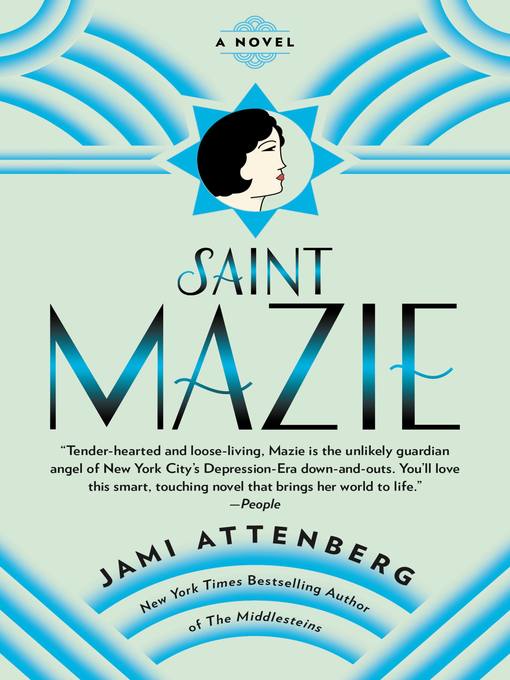
Saint Mazie
A Novel
کتاب های مرتبط
- اطلاعات
- نقد و بررسی
- دیدگاه کاربران
نقد و بررسی

April 6, 2015
Attenberg’s (The Middlesteins) new novel is based on the WWI- and Depression-era life of Mazie Phillips, Queen of the Bowery (and subject of a famous Joseph Mitchell New Yorker profile). The story unfolds mostly through diary entries, but also snippets from an unpublished autobiography (fictional, like the diary entries) and recollections of those who met or knew of the woman who, according to her New York Times obit, “passed out advice, money, and sympathy” to men who lost their livelihoods and dignity during the 1930s. Her coarseness of voice is on display as she tells her life story, eventually being taken in by Rosie and Louis Gordon, her older sister and brother-in-law. Louis owns legitimate businesses—such as the theater Mazie runs—but in all likelihood is a loan shark. Meanwhile, Rosie’s demons force the family to move throughout New York City. As for Mazie, the good-time girl is also a woman who cares deeply about the less fortunate, and this plays out most endearingly in her friendship with a pious nun. In the book’s final quarter, Mazie wanders the streets handing out change and calling ambulances for people, a pattern that seems emblematic of a difficult time, painting a vivid picture of life during the Depression.

March 1, 2015
Early 20th-century New York and its denizens portrayed through the fictional diary of a nonfictional heroine.Mazie Phillips was a real person, a rough-and-ready Mother Theresa who walked the streets of Lower Manhattan in the early 1930s, giving out money for food, buying drinks, calling ambulances. She was profiled by New Yorker writer Joseph Mitchell in an essay collected in Up in the Old Hotel (1992), which is how Attenberg (The Middlesteins, 2013, etc.) came to know of her. Attenberg's fictional Mazie begins a diary she will keep for 32 years on Nov. 1, 1907, with this entry: "Today is my birthday. I am ten. You are my present." Born in Boston, Mazie now lives in New York with her older sister Rosie, who has rescued her and another sister from their parents, "a rat" and "a simp." Rosie's husband, Louis Gordon, owns a cinema, and at 21, Mazie begins her long career as ticket-seller. A free-thinking, hard-drinking gal who never marries or has children, Mazie carries on an intermittent, lifelong affair with a sea captain. Their first tryst, on the Brooklyn Bridge, is described in the diary with characteristic blunt eloquence. "We pecked at each other for a minute, figuring each other out. Finally he kissed my upper lip, and then my lower lip....He put his tongue where he liked. I could not argue. I did not even try." Mazie's voice is the most successful thing in this book. Perhaps we didn't need Nadine, the fictional documentarian who puts her story together, adding excerpts of interviews with the sea captain's son, Mazie's now-ancient neighbor, and the great-granddaughter of the theater manager. A particularly odd subplot has the man who supposedly found the diary making a play for Nadine. Too much concept and not enough story, but Mazie might win your heart anyway with her tough-talking mensch-iness.

January 1, 2015
Author of the "New York Times" best-selling "The Middlesteins", Attenberg returns with a new work unexpectedly set during Prohibition and inspired by a real-life figure in Joseph Mitchell's indelible "Up in the Old Hotel". Grand, bigmouthed, bighearted Mazie Phillips spends her days as proprietress of the Venice, an old-line New York City movie theater, and her nights on the town. Then the Depression hits, and she opens the Venice to anyone in need. With a 50,000-copy first printing.
Copyright 2015 Library Journal, LLC Used with permission.

























دیدگاه کاربران